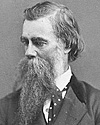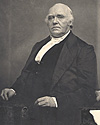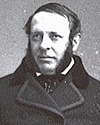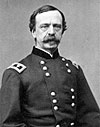Journalist Henry Villard noted that Mary Todd Lincoln started contributing to President Lincoln’s troubles as soon as the family arrived in Washington. She had very strong opinions about people. If she could not convince her husband directly, she sometimes tried more circuitous routes to obtain her way. Villard said: “She meddled not only with the distribution of minor offices, but even with the assignment of places in the Cabinet. Moreover, she allowed herself to be approached, and continuously surrounded by a common set of men and women, who, through her susceptibility to even the most bare-faced flattery, easily gained a controlling influence over her.”1
The situation worsened in the spring of 1862 after Willie Lincoln died. In order to relieve Mrs. Lincoln’s grief, her seamstress, Elizabeth Keckley, encouraged her to patronize spiritualists and mediums. Some “friends” like Henry Wikoff and “Lord” Charles Colchester were accomplished frauds. Others may have sincerely held their beliefs. Still others like Nettie Colburn Maynard, a spiritualist who conducted many seances for Mrs. Lincoln, were simply professionals at their phony craft. Whatever their intention, they certainly wrecked havoc with Mrs. Lincoln’s mental state. Orville Browning recorded in his diary a carriage ride he took with Mrs. Lincoln on January 1, 1863: “Mrs. Lincoln told me she had been, the night before, with Old Isaac Newton, out to Georgetown, to see a Mrs. Laury, a spiritualist and she had made wonderful revelations to her about her little son Willy who died last winter, and also about things on the earth. Among other things she revealed that the cabinet were all enemies of the President, working for themselves, and that they would have to be dismissed.”2
Historian Doris Kearns Goodwin wrote: “Spirtualism would reach epic proportions during the Civil War, fueled perhaps by the overwhelming casualties.”3 Princess Salm Salm, the American wife of a German officer in the Union army, recalled: “”The spiritualist epidemic was then commencing to rage in America. One heard of nothing but of spirits and mediums. All tables and other furniture seemed to have become alive, and you could not sit down upon a chair without a spiritual suspicion.”4 Civil War scholar Ernest B. Furguson wrote: “This was not a superstition restricted to slave and servants; prominent Boston intellectuals, European royalty, men as hardheaded as Dan Sickles and Gideon Welles has sought to contac the dear departed in seances presided over by mediums who claimed the magic touch. Spiritualism was an international fad of the mid-nineteenth century, its practitioners holding forth in places as unexotic as Mary’s hometown of Lexington, Kentucky, and now in the White House itself.”5
“Spiritualism, the accompaniment of long and wasting wars, was rampant in the capital in the third winter of conflict. People sat hand in hand around tables in the dark, to hear bells rung and drums thumped and banjos twanged,” noted historian Margaret Leech. “The mediums were coining money in the capital. One of the most successful was a young and personable man called Colchester, who claimed to be the illegitimate son of an English duke. Mrs. Lincoln received him into her home, and hopefully listened to the scratches and taps which were supposed to represent messages from Willie.”6
Spiritualists also used the mail as a medium for their shenanigans, according to William O. Stoddard. “The spiritualists favored him constantly, and I still have in my possession urgent epistles signed with the facsimile signatures of half the dead worthies in our history, not to speak of sundry communications from the Apostles and the Angel Garbiel, of the correctness of whose signatures I am not so certain. As a general thing, during the war, we believed that so soon as a man went clean crazy his first absolutely insane act was to open a correspondence, on his side, with the President.”7
For both Mr. and Mrs. Lincoln, communication with the dead seemed natural. President Lincoln once asked a Union army officer: Do you ever find yourself talking with the dead? Since Willie’s death, I catch myself every day involuntarily talking with him as if he were with me.”8
“The days during which the President lay in state before they took him away for his long progress over the country he had saved were even more distressing than grief would have made them,” security guard William Crook later recalled. “Mrs. Lincoln was almost frantic with suffering. Women spiritualists in some way gained access to her. They poured into her ears pretended messages from her dead husband. Mrs. Lincoln was so weakened that she had not force enough to resist the cruel cheat. These women nearly crazed her. Mr. Robert Lincoln, who had to take his place now at the head of the family, finally ordered them out of the house.”9
Dr. Anson G. Henry remained at Mrs. Lincoln’s side for six weeks, however. “I believe our departed friends hover over and around us, and are fully cognizant of all that transpires, while we are not sensible of their presence,” Henry wrote his wife about his beliefs. “I have made Mrs. Lincoln a convert to this doctrine & it is fast becoming a great source of comfort and consolation to her. When I was to see her this evening she was comparatively joyous.” 10
Spiritualists have tried to claim Mr. Lincoln has one of their one. But longtime friend Ward Hill Lamon wrote that President Lincoln “was no dabbler in divination, astrology, horoscopy, prophecy, ghostly lore, or witcheries of any sort.”5 Lincoln chronicler Lloyd Lewis wrote: “In these dark hocus-pocuses Mrs. Lincoln found comfort, and Lincoln let them go on for a time, careless of whether the intellectuals of the capital thought him addle-pated or no.”11 Dr. Gurley recalled that “Mr. Lincoln was greatly annoyed by the report that he was interested in spiritualism. He told me he thought the report originated from the fact that a medium had chanced to call on Mr. Lincoln. ‘A simple faith in God is good enough for me, and beyond that I do not concern myself very much,’ he added.”12 John G. Nicolay wrote: “I never knew of his attending a séance of Spiritualists at the White House or elsewhere, and if he ever did so it was out of mere curiosity, and as a matter of pastime, just as you or I would do. That he was in any sense a so-called ‘Spiritualist’ seems to me almost too absurd to need contradiction.”13
After reviewing the supposed evidence of Mr. Lincoln’s spiritualism, historian Jay Monaghan concluded that only four “spiritualists” had access to the President: Charles Colchester, Charles Foster, Dr. Fayette Hall and Nettie Colburn Maynard. Neither Colchester nor Foster left any written record of their interactions. Maynard left an extended memoir. According to Monaghan, “Dr. Fayette Hall, before writing his two sardonic works on spiritualism, made the acquaintance of all the mediums who were close to Abraham Lincoln and he pronounced their supernatural demonstrations genuine. During a persona interview with the President which Dr. Hall did not enjoy, he became convinced that Lincoln was being influenced by very bad spirits, who ‘were devilish, for no honorable spirits would require the President to violate his oath and obligations, and perjure himself to obey and carry out their orders by employing the army and the sword.’ Hall’s work is valuable for the personal information it contains about Lincoln’s spiritualist acquaintances and as corroborating evidence for the more detailed Maynard story.”14
Where spiritualists or influence-pedlars, Mrs. Lincoln had a strange taste in friends while in the White House. Historian Stephen Berry wrote: “Mary claimed that she kept men like Halsted, Sickles, and Wikoff around because they were powerful and could help her husband. The journalist Henry Villard suspected another reason: that Mary had an appetite for flummery so voracious that only the ‘most bare-faced flattery’ could sate it – and these men were the country’s flum-masters.”15
Footnotes
- Henry Villard, Lincoln on the Eve of ’61, p. 103.
- Carl Sandburg, Abraham Lincoln: The Prairie Years and the War Years, p. 394.
- Doris Kearns Goodwin, Team of Rivals: The Political Genius of Abraham Lincoln, p. 422.
- Princess Felix Salm-Salm, Ten Years of My Life, p. 45.
- Ernest B. Furgurson, Freedom Rising: Washington in the Civil War, p. 244.
- Michael Burlingame, editor, Inside the White House in War Times, White House Sketches #4, p. 157 from William Stoddard, White House Sketches, No. 4.”
- David Homer Bates, Lincoln in the Telegraph Office, p. 210.
- Margarita Spalding Gerry, editor, Through Five Administrations: Reminiscences of Colonel William H. Crook, pp. 69-70.
- Harry E. Pratt, “Dr. Anson G. Henry, Lincoln’s Physician and Friend,” Lincoln Herald, Volume 45, No. 3, October 1943, p. 38.
- Susan B. Martnez, The Psychic Life of Abraham Lincoln, p. 127.
- Lloyd Lewis, Myths After Lincoln, p. 301.
- Ervin Chapman, Latest Light on Abraham Lincoln and War-time Memories, p. 505.
- Jesse W. Weik, The Real Lincoln: A Portrait, p. 370. (Letter from John G. Nicolay to Jesse W. Weik, November 25, 1894.
- Jay Monaghan, “Was Abraham Lincoln Really a Spiritualist?” Journal of the Illinois State Historical Society, June 1941, p. 214.
- Stephen Berry, House of Abraham: Lincoln & The Todds, A Family Divided by War, p. 101.
Visit













